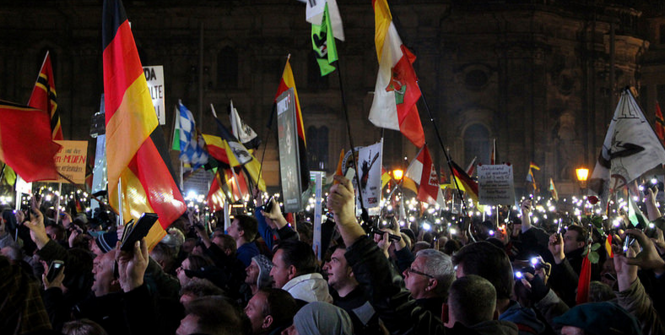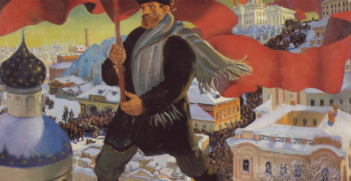The Rise of Europe’s Far-Right and the Anti-Islam Tide

The notion of Europe being “invaded” by an Islamic other has gained considerable traction in the past decade and a half.
This rhetoric routinely cites the mass migration that followed World War II as starting the process, and uses more recent migration – in particular the ongoing plight of those fleeing the civil war in Syria – to argue for resistance to this invasion. Perceiving migration as an insidious process as opposed a humanitarian one, the narrative of invasion argues that, once here, those migrants, refugees and asylum-seekers that happen to be Muslim will then go on to “Islamify” the nation states that generously afforded them shelter.
Such rhetoric can be found across various settings. At its most extreme, it was evident with Norway’s Anders Behring Breivik who – shortly before killing eight people with a bomb in Oslo and a further 69 at a summer camp on the island of Utøya – uploaded a manifesto to the internet that called for resistance against the Islamic invasion of Europe as justification for the atrocities he went on to commit. Breivik added he was far from alone in this resistance, citing Germany’s Nationalsozialistischer Untergrund (National Socialist Underground) and Sweden’s Peter Mangs as examples.
That same discourse can be seen in the political mainstream also: the former Italian Prime Minister Silvio Berlusconi has stated that Milan would become an ‘Islamic city’ while the Sverigedemokraterna (Swedish Democrats) have called for the need to limit the ‘birth rate’ of Muslim migrants to the country. In relation to the Syrian refugee crisis specifically, the Hungarian Prime Minister Viktor Orban has alluded to the vast numbers of Muslim migrants being part of a ‘master plan’.
This rhetoric has found greatest resonance among Europe’s far-right milieu. Shifting away from historical and more traditional ideologies focusing on Jews and Judaism, Europe’s far-right increasingly deploys the rhetoric of invasion and Islamification to present Muslims and Islam as a very real and tangible threat to the continent’s national and cultural unity.
The impact of this has been twofold and can be illustrated in the British setting. The first relates to the impact of the far-right in shaping and influencing the political mainstream. The British National Party (BNP) was established in 1982 from the remains of the ‘whites only’ National Front. Having existed solely on the political margins, once Nick Griffin took over as leader in 1999 the BNP started to run a series of anti-Islam campaigns across the north of England. Catalysed by 9/11 and bolstered by the 7/7 suicide bomb attacks on the London public transport system in 2005 the BNP went national with its campaign, Islam out of Britain. In doing so, it claimed to be the only political party that dared to tell the truth about the threat posed by Muslims and Islam to British democracy, freedom and identity. In 2006, the BNP won an unprecedented 33 seats across the country, the most significant being in east London where it won 11 of 13 seats in Barking and Dagenham. It became the first time in British history that a far-right party was the official party of opposition. In 2008-2009, the BNP won a seat in the London Assembly followed by two seats in the European Parliament.
While the BNP is now largely defunct – internal wrangling, the failure to deliver and the loss of funding all contributing to its demise – the BNP was successful in bringing the issue of the perceived threat of Muslims and Islam into the political mainstream. So much so that it could be argued that not only was the BNP influential in shifting the mainstream towards the right but also influenced mainstream politicians to adopt some of its less extreme ideas.
The second relates to the impact of far-right street-level movements in shaping populist opinion and attitudes. The English Defence League (EDL) is a street-level movement that first emerged in 2009. Comprising members of different football hooligan “firms” alongside those with traditional links to other far-right groups, the EDL sought to demarcate itself from those same traditional groups by claiming that the EDL was merely a collective of concerned individuals who wanted to stop Britain being transformed into an Islamic state. The EDL was able to organise street marches and protests across the length and breadth of England against various issues, especially the building of mosques. The group were able to exploit social media to promote its message and regularly attracted up to 3,000 people to its marches. More important though is the way the EDL garnered popular support and indeed empathy for what can only be seen to be a divisive ideology.
This twofold resurgence of the far-right can be seen across the entirety of Europe. As regards the far-right’s impact on the political mainstream, one needs only consider France’s Front National (National Front) or the success of Lijst Pim Fortuyn (Pim Fortuyn List) in the Netherlands. While the electoral success of the latter was relatively short lived, its legacy of opposing ongoing migration and the detrimental impact of Islam on Dutch values remains. As regards the impact of the far-right at street level, Germany’s Patriotische Europäer Gegen die Islamisierung des Abendlandes (Patriotic Europeans against Islamisation of the Occident or PEGIDA) is proof of the groundswell of support that populist anti-Islam and anti-immigration movements are able to quickly and easily garner. Most recently, PEGIDA has begun to market itself as a pan-European movement with protests being held in Belgium, Denmark, Norway, Spain and Switzerland among others. Next month, the former leader of the EDL will be speak at PEGIDA’s first protest in Britain.
Pessimistically, the ongoing Syrian refugee crisis and the emergence of Islamic State will mean that the situation will continue to deteriorate. While nation states in Western Europe have already seen the impact of a resurgent far-right, the sheer number of refugees arriving in Eastern Europe has the potential to provide a fertile seedbed for the far-right there too. While this sentiment is likely to first find form at street-level, comments by the Hungarian Prime Minister show the potential for the far-right to affect the political mainstream also.
It is not only large numbers of refugees that will give further impetus to Europe’s already resurgent far-right. Terror attacks perpetrated by Europe-born Muslims that have returned from fighting in Iraq or Syria or those who were formerly refugees or asylum-seekers will have detrimental ramifications. In the wake of last year’s Paris attacks, mainstream politicians must not fail to address what some are already referring to as “blowback”. Those in the far-right will be waiting in the wing not only to voice their opposition but also to fill the political void if the opportunity arises. In doing so, those far-right voices will continue to exploit the view that Europe is under siege from an invading Islamic other as it has been – in their minds at least – throughout history.
Dr Chris Allen is a Lecturer in Social Policy at the University of Birmingham and specialises in the phenomenon of Islamophobia. This article may be republished under a Creative Commons License.





